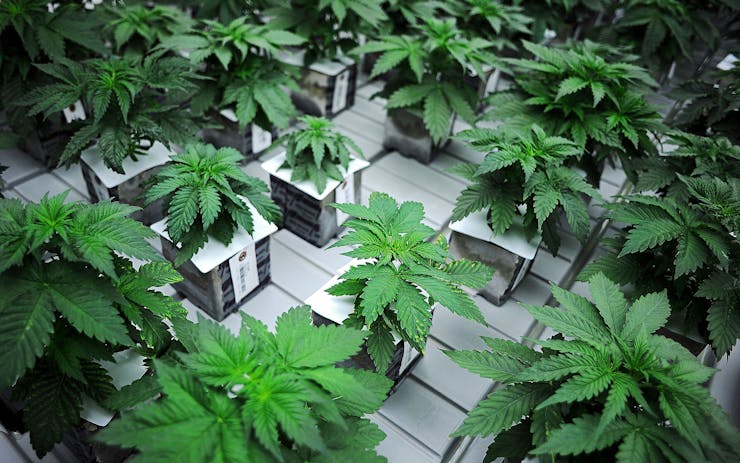Members of the Oglala Sioux Tribe will vote this week on legalizing medical and recreational cannabis on South Dakota’s Pine Ridge Reservation in an initiative that many hope will bring economic development to one of the most impoverished areas in the country.
Neither South Dakota nor nearby Wyoming and Nebraska have legalized marijuana, and tribal leaders think marijuana could rake in millions of dollars. If the measure is approved, the Oglala Sioux Tribe would become the only Native American tribe to set up a cannabis market in a state where it’s otherwise illegal.
“People will be coming in from all directions to get their medicine,” said Ricky Gray Grass, a tribal leader.
After witnessing the growth of the cannabis industry and the success of the Paiute Indian Tribe selling marijuana near the Las Vegas Strip, tribes across the nation — from the Red Lake Band of Chippewa in Minnesota to the Cherokee Nation in Oklahoma — are considering the economic and medical potential of marijuana. But they also face uncertain policy on marijuana enforcement under President Donald Trump’s administration.
Cherokee Nation officials have argued that legalization would threaten some of the federal funding the tribe receives. California tribes have hesitated to set up dispensaries over fears they could lose their gambling licenses, said California Democratic Rep. Lou Correa. He introduced a bill to ensure tribes could sell marijuana, but it hasn’t gained traction.
The Oglala Sioux Tribe is poised to test federal and state policy. Tribal members will vote Tuesday on whether to approve medical marijuana, recreational marijuana, and allowing alcohol at the tribe’s casino. The tribal council is then supposed to implement any changes voters approve.
Under the leadership of a new president, Julian Bear Runner, the tribe is arguing its sovereignty gives it the right to cultivate and sell marijuana. His office is pitching it as a “jump-start” to the local economy that would provide jobs and bring in money to fix crumbling roads.
Bear Runner declared a “state of emergency” on the reservation in January over meth addiction, homicides related to drug trafficking, and a lack of federal funding to address the problems.
“We need an internal, regenerative, self-sustaining solution,” said Chase Iron Eyes, a spokesman for the president.
But those drug problems are the very reason some tribal members are hesitant to legalize pot. In an effort to sway them, Iron Eyes and Gray Grass have pitched marijuana via a weekly “cannabis hour” on the local radio station and community forums on the weekends.
Shop highly rated dispensaries near you
Showing you dispensaries near“I think it’s going to win by a landslide,” said Gray Grass.
One South Dakota tribe has already clashed with state and federal authorities over marijuana. The Flandreau Santee Sioux Tribe attempted to set up a marijuana resort in the eastern part of the state in 2015, but eventually burned its cannabis crop out of fear of a federal raid. State officials strongly opposed the tribe’s plan.
'Marijuana enforcement is not the federal government’s highest priority at this point.'
On Pine Ridge, tribal leadership is drawing up plans aimed at appeasing the state, including a prohibition of people taking cannabis off the reservation.
Scott James, the Oglala Sioux Tribe’s attorney general, said state laws still apply to people who aren’t members of the tribe, even if they are on tribal land. But it’s not clear how — or if — those laws would be enforced.
“Marijuana enforcement is not the federal government’s highest priority at this point,” James said.
The U.S. attorney’s office for South Dakota declined to comment on the Oglala Sioux’s plans. Tim Bormann, a spokesman for state Attorney General Jason Ravnsborg, said only that the office was watching Tuesday’s vote.
Meanwhile, South Dakota’s laws could also change, with residents set to vote on whether to legalize medical and recreational marijuana in November.





